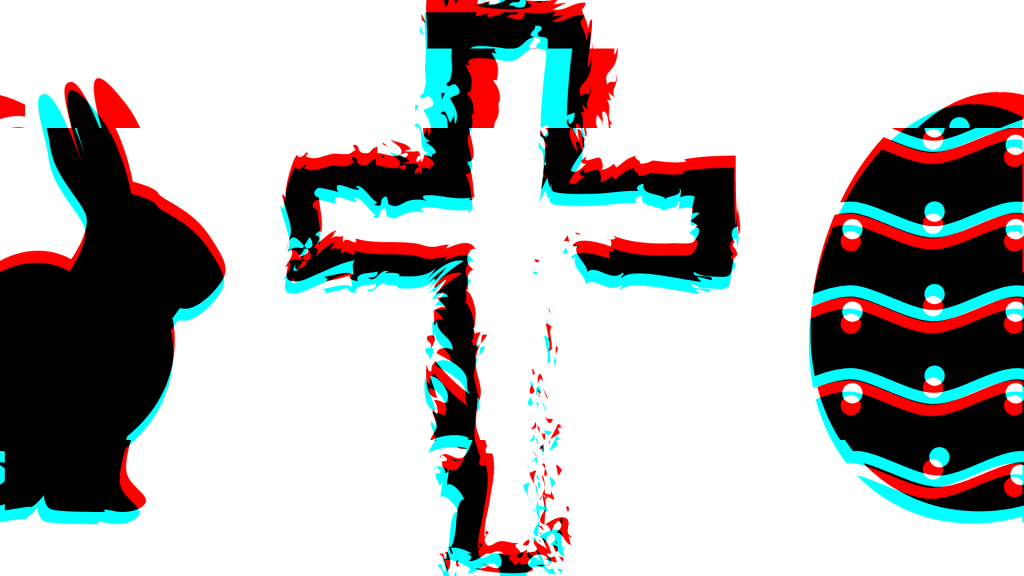How do a magical bunny, eggs, the names “Maundy” and “Good Friday,” and the death of an innocent man all come together?
These questions often arise this time of year so I’ve put them together in a blog.
1. Why does the date always change?
Christmas is a fixed day. But Easter is based on the Paschal Full Moon. Since the date is determined by the lunar schedule, it fluctuates. But it’s always between March 21 and April 25.
2. What does the word “Easter” mean?
Some word-origin dictionaries trace it through various languages meaning different spring-ish things. According to one person it is connected to an old Anglo-Saxon spring or fertility goddess called “Eostre.”
However, as Christianity grew it began to use the name for it’s own celebration of the death and resurrection of Jesus (which coincided with spring).
Since the name can be confusing or may have concerning origins, some people prefer to say Resurrection Sunday instead of Easter Sunday.
3. What is the significance for Christians?
For Christians (like me), the cross and empty tomb are the main event, not only for our lives specifically, but for human history generally. That’s why so many of us wear crosses around our necks and put them up in our homes or churches. At Easter, we honour the death and coming-back-to-life of our name sake: Christ.
The fact that Jesus comes back to life has many meanings. One is that it’s God’s way of showing Jesus’ innocence; he is who he said he was. The resurrection overturns his unjust condemnation and trial. His previous humiliation is turned into exaltation. Everything he said and did is now vindicated in the most dramatic possible way.
Another meaning is that death no longer has final say–not only for Jesus, but for those who follow him. The resurrection ushers in God’s new creation in which life is stronger than death, in which light is brighter than darkness, in which good is more powerful than evil, and in which love is more enduring than hate.
The resurrection, therefore, anticipates the kind of new God-breathed life that is in store for those who choose to be enlisted in God’s renovating work in the world. It’s not just about what will eventually happen to those who follow Jesus (resurrection), but about what is currently happening in the world.
Jesus continues to be alive to lead this hope-filled work. God has not given up on his world. Stephen Seamands writes: “To be a Christian is to believe and confess that Jesus is alive.” So for Jesus’ followers, he’s not just a historical figure, but our now-ruling King and Lord.
Our worship services and lives at this time of year (and, in fact, all year) acknowledge these realities with prayers, singing, Bible readings, sermons, charity work, and servant-based activities. The fact that our weekly worship services occur on Sunday is not accidental: They coincide with the day Jesus was resurrected. In the words of N.T. Wright, it is “the birthday of God’s new world.”
4. What’s with the names “Maundy Thursday” and “Good Friday”?
That’s right: Maundy, not Monday. It’s the Thursday before Easter and is from the Latin translation of Jesus’ words in John’s Gospel, chapter 13, verse 34: “Mandatum novum,” meaning “new commandment.” Here’s the full verse:
It also commemorates the original Last Supper when Jesus had a Passover meal with his disciples, and when he washed their feet as a sign of his love and servanthood.
Good Friday is the day Jesus was executed on the cross. Key to understanding the meaning of this event is this prophecy which was written hundreds of years before Christ:
But he was pierced for our transgressions,
Isaiah 53:5 NIV
he was crushed for our iniquities;
the punishment that brought us peace was on him,
and by his wounds we are healed.
I was once asked why it was called Good Friday instead of Sad Friday. One explanation is that the word “good” comes from “God,” so it’s really “God’s Friday.”
Another explanation is that it’s the day Jesus paid the penalty for our sin and brokenness. Since he took upon himself the punishment that you and I deserve, it is a day that delivers good news for those who accept this free gift. In this sense, Good Friday is good not because of what happened to Jesus, but because of what happened for us.
Good Friday is also the day you’ll sometimes see people having cross parades through the streets.
(More on the meaning of Jesus’ death below in question six.)
5. How do the Easter bunny and eggs fit into all this?
I had no previous knowledge about this one. So I did some digging.
It seems the first records of an Easter bunny are from the 1500’s. Some sources trace it’s passage to North America from German immigrants who had traditions of a bunny (and sometimes, a man) who left eggs for good kids the night before Easter Sunday.
Notice the similarity to Christmas: goods are left on the night before the holiday, and only for well-behaved children. The good behaviour part has kind of dropped out in a society like ours where we continually hear the doctrine that you should do-what-makes-you-happy and where there tends to be a lack of consequence for bad behaviour.
Since bunnies seem to reproduce themselves at astronomical rates they are symbols of fertility and spring. Eggs also symbolize new life. Put them together and poof! Bunny delivering egg-ish goodness.
I should say that some people, including myself, use cracked-open eggs to symbolize the empty tomb. But that custom simply seems to be a convenient teaching tool to draw our attention, as Christians, back to the reason for the season.
So how do the Easter bunny and eggs connect to the crucifixion and resurrection of Jesus? They don’t. But we’ve always been good at finding reasons to stuff ourselves like Augustus Gloop during a holiday.
6. “Why did Jesus have to die?”
Yes, it can be a challenging question to answer. The ancient Romans tortured and crucified an innocent man, but who was perceived and presented as a revolutionary and rival king to Caesar. And then he rises from the dead three days later. A miracle! And believe you me, this would have been just as surprising then as it was now.
Jesus’ death has many meanings—like holding up a many-sided diamond in the sun and watching the light cascade in different directions. But here’s one of the biggest:
God is just. And we are broken, sinful people. If you’re not used to this language that might seem harsh; but stick with me.
If you’re honest, you know you’re broken, and that you haven’t fulfilled God’s greatest command (to love him and others with everything you’ve got). A single lustful thought is like adultery. Have you ever wish you had something someone else had? That’s coveting. Have you looked the other way when someone was in need? Have you ever know the right thing to do and not do it? Yup, that counts too.
All of us sin. And that sin separates us from God—forever. No amount of good deeds or ‘being nice’ can bridge the gap between us and a perfect, just and holy God. So Jesus bridged the gap for us. On our behalf.
Jesus took onto himself the punishment that you and I deserve. It’s sometimes called the great exchange. The Righteous One (Jesus) gives his life for ours—in place of the rebels, the wrecks, and every day people like you and me.
So one day, when we stand before God, he doesn’t see our failed and meagre record, but Jesus’ perfection. Talk about a wonderful gift!
If you think it’s unfair that God pours out his wrath on an innocent third party, think again. Jesus is God come to us in human form. He is Immanuel: God-with-us. And so it’s God taking our punishment upon himself.
As my brother Deric sings in one of his songs, nails did not keep Jesus on the cross: love did.
And he did it for you and me.
Yes, death is a part of life. But not eternal life.
Happy Easter!


Leave a reply to MatthewRuttan Cancel reply